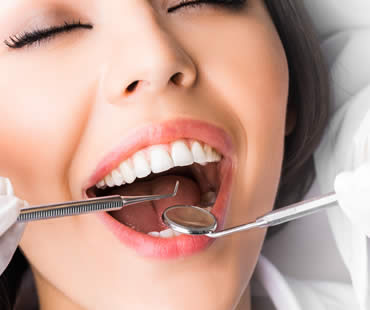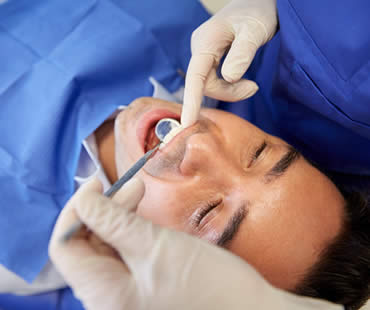
Nitrous oxide, otherwise known as laughing or happy gas, is a colorless and odorless gas that you inhale through your nose. The effects of nitrous oxide are a relaxed feeling and diminished pain, making it an ideal sedation option for many dental procedures. Advantages of sedation utilizing nitrous oxide include:
- The effects of nitrous oxide make their way to the brain in mere seconds, and the pain relieving properties develop in just minutes.
- Your sedation dentist can alter the level of sedation during treatment.
- Nitrous oxide can be administered for the exact amount of time it is needed to complete the procedure.
- Nitrous oxide has no negative after-effects because it is eliminated from the body within five minutes after the sedation is stopped.
- Your sedation dentist has complete control and is able to give incremental doses of nitrous oxide, eliminating the risk of accidentally overdosing.
- No injection is required, making nitrous oxide a very attractive option for patients with a fear of needles.
- The relaxing effects of sedation with nitrous oxide is known to eliminate or reduce gagging.
- Sedation with nitrous oxide is considered very safe and has no negative effects on other organs of the body.
There are a few potential disadvantages of sedation with nitrous oxide, including:
- Some patients may not achieve the desired level of sedation with the maximum amounts of nitrous oxide allowed.
- Patients who are mouth breathers, have claustrophobia, or have difficulty breathing through their nose may not be good candidates for nitrous oxide.
- If you are prone to nausea or a sensitive stomach, nitrous oxide may not be a good option.
If you need a dentist in Longview contact us today

Most of us know we should visit our general dentist every six months for exams and cleanings to ensure optimal oral health, but it seems we find many reasons to avoid those visits. Busy schedules or fear of dental treatments often mean people skip critical routine oral care. However, there are several reasons why you should make regular appointments with your general dentist a priority.
First, routine cleanings by your general dentist will give you a brighter, healthier smile. While brushing and flossing at home are important, it is impossible to remove all of the plaque that accumulates over time. Left untreated, plaque causes decay that leads to cavities and gum disease. Professional cleanings by your general dentist removes plaque and stains, leaving your breath fresher and your smile whiter.
Second, regular examinations allow your dentist to identify potential problems before they become severe. Cavities and gum disease caught early are much simpler to treat, preventing the need for procedures like root canal therapy, crowns, or even tooth extractions. Seeing your general dentist routinely will keep these types of problems in check, and save you from more complex and invasive procedures later.
Finally and most importantly, regular checkups with your general dentist can have a direct impact on your overall health. Poor oral health affects your entire body. A decayed tooth can cause a bacterial infection that spreads to other areas of your body. A general dentist checks your mouth for signs of disease, decay, and even certain cancers.
Stop making excuses and find a qualified general dentist with hours and an office location that is convenient to you. Consult with the staff about your dental fears and learn what types of services are offered to make your visit less stressful. If you value both your beautiful smile and your excellent health, be sure to keep regular visits to the dentist on your calendar.
Schedule your appointment at our Longview dental office

Sedation dentistry is often hailed as a solution to all of a patient’s problems regarding dental therapies. It can address anxiety, fear, stress and pain. It can provide a comfortable experience for the dental patient, allowing the dental professional to work safely and quickly. As with any pharmacological agent, there are risks, and before you agree to any sedation dentistry option, it is smart to educate yourself about some of those risks.
While single doses of oral sedatives such as Valium or Halcion are unlikely to harm a patient, there are concerns regarding multiple doses of these drugs that could potentially cause a patient to be overly sedated, or even completely unconscious. Because each patient has a different metabolism, drugs can take between twenty minutes and an hour to become fully effective.
These time-delay issues are not problematic for inhaled sedation or for IV sedation, as these types of sedation dentistry are effective almost instantaneously. For oral sedation, however, a dentist who administers more than one pill could cause an overdose if the medicine kicks in at the same time. Most dentists lack both the equipment and the training to effectively and quickly address an overdose in a patient who is unconscious.
In 2000, a group known as the Dental Organization for Conscious Sedation was launched. Its purpose is to train dentists on sedation dentistry methods such as how to properly monitor a patient during a dental procedure to ensure that their heart rates and oxygen levels are healthy. Despite this, there are still concerns about adverse effects of adults with oral conscious sedation. There have been no reported adult deaths from overdosing; however, some children have died from oral sedation, leading to the practice being recommended only for adults.
If you are about to undergo a prolonged dental procedure, or if you are considering sedation dentistry to address personal anxiety or a dental phobia, look for a dentist who has received training in sedation dentistry and has high levels of experience to ensure that your procedure is as safe and comfortable as possible.
Our dental office is located in Longview

You might think that the point of going to your general dentist is for cleanings and maybe an occasional filling. But you are wrong if you believe that’s all your dentist can offer you! A wide variety of treatments is available at a typical general dentist’s office.
Most visits to your general dentist include an initial consultation, thorough examination, and diagnostic tests if needed like dental x-rays. You’ll have the opportunity to express any problems or concerns you have, and your dentist will identify any issues that you might not be aware you have. You can also expect a meticulous professional cleaning to eliminate tartar buildup and stains that you may not have been able to get rid of at home.
You can expect these common procedures at many general dentistry practices:
- Fillings – to repair damage caused by tooth decay, often using composite resin material to provide a strong yet cosmetically appealing solution.
- Bonding – using composite resin to repair issues like cracks, chips, gaps or stains.
- Crowns – also called caps, these restorations are fitted over damaged or broken teeth to restore tooth structure and function, and to protect them from future damage.
- Bridges – to replace missing teeth, a bridge structure anchors an artificial tooth or teeth. Crowns fit over natural teeth on both sides of a gap, in which the artificial tooth replaces a missing tooth to provide a natural appearance and functional replacement.
- Dentures – if a number of teeth are missing, dentures are removable false teeth with the goal of functioning and looking like real teeth.
- Root canal treatment – when the interior pulp of a tooth is badly damaged or infected, this procedure removes the faulty portion and completely restores the tooth to avoid tooth loss.
- Teeth whitening – when teeth have become discolored with age, tobacco use, diet, or more, it can be very difficult to restore their white shade without the aid of professional whitening. General dentists may offer at-home kits or in-office whitening treatments.
- Maxillofacial treatments – mouth, jaw, or facial procedures are sometimes offered, including options like TMJ treatment or dental implants.
If you live in the Longview area contact us today

Severe dental phobia can cause people to completely avoid dental examinations and treatments. Anxiety about dental treatment can develop for many reasons, including fear of pain, the feeling of not having control, fear of needles, a strong gag reflex, or a history of bad dental experiences. If you suffer from extreme dental fears causing you to neglect necessary oral care, sedation dentistry may be the answer to your problem.
A trained sedation dentist can offer a variety of options to address your situation:
- Minimal sedation in the form of nitrous oxide allows you to be awake but relaxed during dental treatment and may be a good option for cleanings, routine examinations, or minor procedures. Your dentist is able to control the amount of sedation you receive.
- Oral conscious sedation also allows you to remain awake during procedures, but may cause you to feel drowsy and will keep you from having much memory of the treatment. A stronger dose can be given to produce more moderate sedation, in which case you may fall asleep but can easily be awakened.
- IV sedation is when a sedative drug is administered through a vein. This type of sedation works rapidly and also allows your dental professional to adjust the level of sedation during treatment.
- General anesthesia provides deep sedation through medications administered that cause nearly complete or total unconsciousness. With general anesthesia you cannot be awakened until the effects of the drugs have dissipated.
Sedation dentistry can be used for any type of dental procedure, from routine cleanings to more complicated, invasive procedures. Thanks to advances in sedation dentistry, you no longer have to fear the dentist and avoid necessary oral health care.
If you live in the Longview area contact us today

Keeping your teeth and gums in good condition can mean the difference between being embarrassed to smile and being happy to display your pearly whites. Your smile is one of the first things people notice, so here are some things to add to your dental care routine so that your teeth are sparkling and healthy.
Brush after consuming staining items:
Avoid foods and drinks that are known to stain your teeth, such as coffee, red wine, colored gravies, and dark colas. Brush your teeth as soon as possible after consuming such items. If brushing isn’t possible, try eating an apple to help clean away staining residue.
Change your toothbrush:
Old bristles that are out of shape and worn harbor bacteria and don’t as good of a job as newer brushes. Change your toothbrush every three months, or when it starts to look worn. Remember to choose a brush with soft bristles for the best treatment of your teeth and gums.
Floss regularly:
Use dental floss at least once every day to clean between your teeth and along your gums. Carry floss with you so that you can quickly use it in private moments after a meal or bothersome snacks.
Use mouthwash:
Add mouthwash to your daily routine to help kill bacteria that your toothbrush doesn’t reach. It also can help improve your breath.
See your dentist:
No matter how well you care for your mouth, see your dentist every six months for checkups and professional cleanings. This will not only keep your teeth bright, it will catch any problems early in hopes of avoiding more extensive dental work in the future.
If you live in the Longview area contact us today









